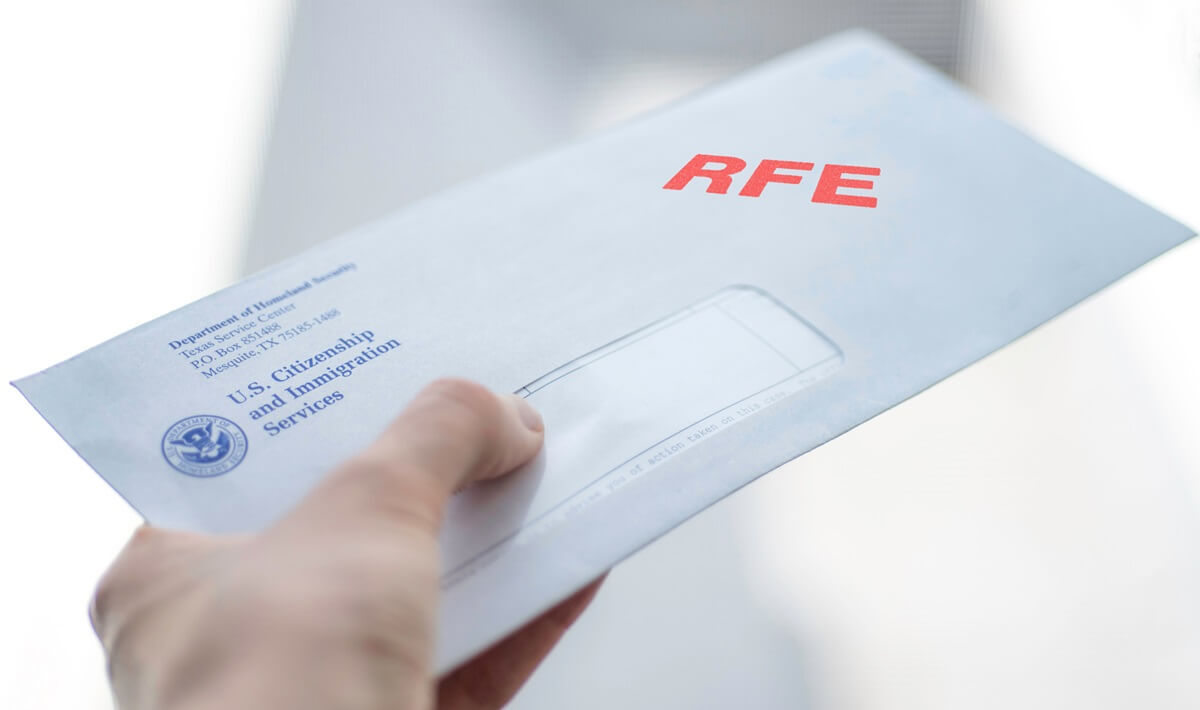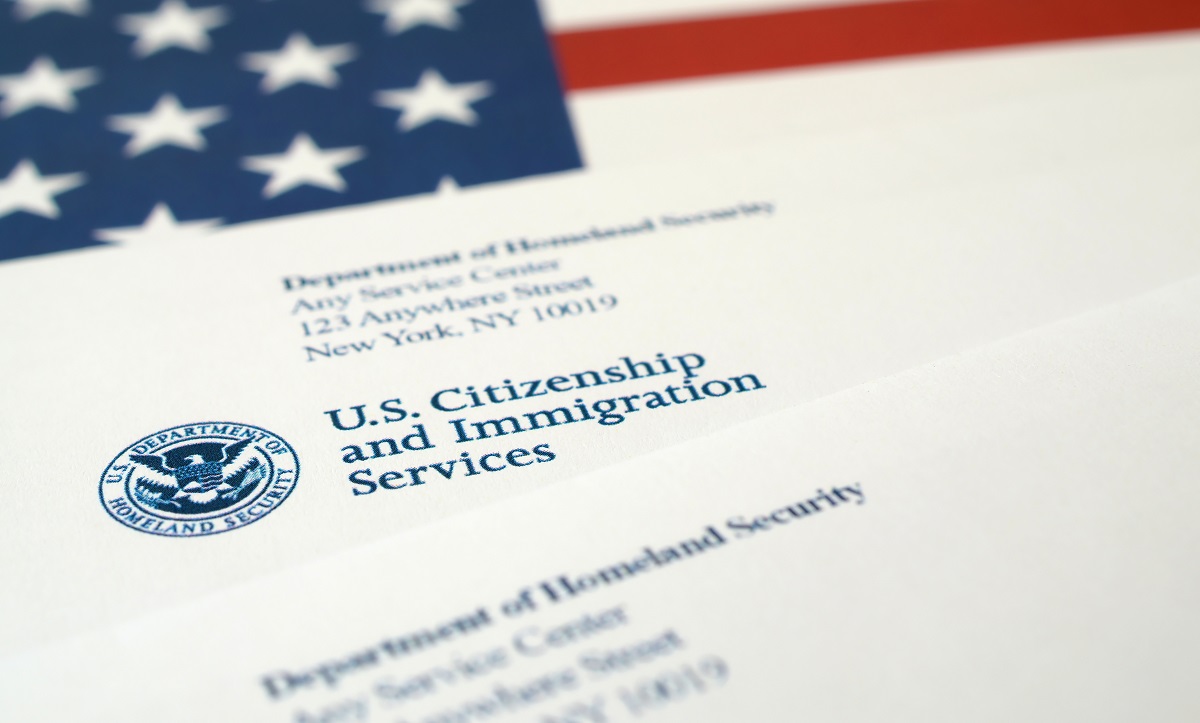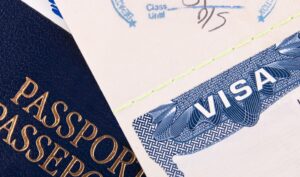
When applying for a family-based green card, there is one type of I-485 RFE (Request for Evidence) that’s more common than all others. We routinely hear from do-it-yourself immigration filers and even several law firm clients who received an RFE in response to their green card application. There is a common reason many people’s applications get flagged, and you can likely avoid it.
Request for Evidence Effect on an I-485 Case
Most I-485 RFEs are the Result of an Insufficient Form I-864
Request for Evidence Effect on an I-485 Case
RFEs are awful. They add anxiety to an already stressful situation, and they add delay to an already painfully slow immigration process. Adding to the confusion, USCIS RFE letters can be extraordinarily generic. For some reason, the I-485 RFE letters are written particularly vague. They rarely specify the exact problem. USCIS may even use scripted language about missing components which you know you included with the form. For the applicant (and even professional preparers), it's not helpful.
If you’re using CitizenPath, it’s our job to help you avoid RFEs altogether. Our affordable online service helps you prepare a rock solid Affidavit of Support Package. Based on your situation, we generate a checklist of supporting documents so that you know exactly which items to submit with the form. See our reviews.
This article is for you even if you won’t be using our service. You should only use this article for information purposes as each person’s situation is unique. But it may help you decipher your I-485 RFE and get to the bottom of the deficiency.
Most I-485 RFEs are the Result of an Insufficient Form I-864
Based on our experience, most green card applicants who receive an I-485 RFE, receive it because they lacked a strong Form I-864, Affidavit of Support. For the vast majority of family-based applications, Form I-864 is required to overcome the public charge ground of inadmissibility.
An I-485 RFE related to Form I-864 (Affidavit of Support) is generally triggered by one of the following categories of problems. Potentially, you may have:
- Failed to submit Form I-864;
- Submitted Form I-864, but you failed to include all the necessary evidence;
- Submitted Form I-864, but the sponsor does not qualify; or
- Properly submitted Form I-864, and USCIS sent the RFE by mistake.
Failed to submit Form I-864 (Affidavit of Support)
The petitioner prepares Form I-864 to help the beneficiary to overcome the public charge ground of inadmissibility. Many people see “public charge” on the application for permanent residence (Form I-485) and automatically assume it doesn’t apply to them. If you are a family-based green card applicant, it’s highly likely that you are subject to the public charge test. This simply means that you must meet this requirement.
Although there are certain exemptions for public charge and exemptions for filing Form I-864, almost every person applying for a family-based green card needs a sponsor.
Therefore, responding to the I-485 RFE should be straight forward in this situation. Submit Form I-864 and all necessary supporting documents to USCIS before the deadline.
By the way, even if the petitioner doesn’t meet the income requirements, you must submit an I-864 Affidavit of Support. The petitioning sponsor must always provide Form I-864. Then, the I-485 applicant should submit a second Form I-864 from a joint sponsor.
Submitted Form I-864 but failed to include all necessary evidence
This is probably the most common reason for USCIS to issue an RFE for the I-864 requirement. Sponsors fail to provide sufficient evidence of their qualifications. Generally, this is related to income, but there may be other reasons.
Current Income
If a sponsor prepared Form I-864 with the appropriate size household and accurate current year income, it’s likely that the proof of that income is lacking.
For the typical sponsor who is employed with an income that is well over 125 percent of the federal poverty guidelines, we typically recommend the following supporting documents:
- Employment verification letter
- Copies of paystubs for the current year
- Bank statements to corroborate the deposit of income
- W-2 if the previous year recently ended and you have not yet filed a tax return
Anybody that receives income from self-employment income, foreign income, or non-taxable income, may have some additional requirements. Likewise, you should document any income that comes from alimony, child support or other sources of legal income.
Tax Returns
Although an income tax return is required, it doesn’t prove your current income. It helps to support the evidence of your current income. A current income of $50,000 is partially corroborated if the individual earned a similar amount at the same (or similar) job in the previous year.
A sponsor who did not file a tax return in one or more of the three previous years must explain why. A sponsor who was not required to file should indicate this fact and submit a statement that explains why. Generally, not earning enough in a prior tax year is a sufficient reason for not filing a tax return. (If you’re not sure, ask a tax preparer.)
Incomplete tax returns may also be a cause. USCIS wants a complete tax return (including all W-2s, 1099s, etc.) This helps this identify your earnings, particularly if you file jointly. USCIS will accept an IRS tax transcript in lieu of your complete return. The IRS tax transcript is much easier to handle.
Finally, USCIS must receive your most current tax return. If you’re submitting Form I-864 in January and haven’t filed the previous year’s tax return, expect an I-485 RFE. Likewise, USCIS will likely issue an RFE even if you have a tax return extension. USCIS will want to see the most recent year.
Submitted Form I-864 but the sponsor does not qualify
The most common reason that a sponsor does not qualify is due to qualifying income. The sponsor must have resources that exceed 125 percent of the federal poverty guidelines for the household. Carefully review your calculations and compare to the current FPG tables. If you filed near the beginning of the year, it’s also possible the guidelines were updated.
Another reason that a sponsor may not qualify is related to domicile. The sponsor must be domiciled in the United States. However, there is an exception for a sponsor who intends to reestablish U.S. domicile. Generally, the U.S. government will accommodate a sponsor who is reestablishing U.S. domicile. In these situations, the immigration officer does have the discretion to refuse a sponsor who is not already domiciled. Even if the sponsor’s income will continue when relocating to the United States, the safest approach is to add a joint sponsor.
You may not agree with the USCIS assessment of your qualifications. Although you may be qualified, the applicant's best option may be to add a joint sponsor who satisfies all requirements. If the applicant has a friend or family member who is willing to sponsor them, this is an effective way to make sure they successfully remove the public charge ground of inadmissibility.
Submitted Form I-864 and USCIS sent the RFE by mistake
If you’ve thoroughly reviewed your submission and found no possible holes in your case, it is possible that USCIS issued the I-485 RFE without merit. The immigration agency does occasionally make mistakes by overlooking evidence or coming to a faulty confusion. However, this is rare.
Before responding to the RFE with no additional evidence or documentation, consider running your situation by an immigration attorney. The attorney may have a suggestion for helping you.
Respond to the I-485 RFE
Remember, USCIS rarely issues a second I-485 RFE. If they remain unsatisfied with your response, USCIS will likely deny the case. Take the time to carefully consider all aspects of your RFE response. It should be thorough and conclusive.
About CitizenPath
CitizenPath provides simple, affordable, step-by-step guidance through USCIS immigration applications. Individuals, attorneys and non-profits use the service on desktop or mobile device to prepare immigration forms accurately, avoiding costly delays. CitizenPath allows users to try the service for free and provides a 100% money-back guarantee that USCIS will approve the application or petition. We provide support for the Adjustment of Status Package (Form I-485), Affidavit of Support Package (Form I-864), and several other immigration services.
Want more immigration tips and how-to information for your family?
Sign up for CitizenPath’s FREE immigration newsletter and
SAVE 10%
on our immigration services






